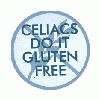
Lisa
-
Posts
8,691 -
Joined
-
Last visited
-
Days Won
15
Lisa's Achievements
-
-
when i had mine, after the endoscopy my GI doc said he saw damage but pathology results only show inflammation, no sign of sprue. is inflammation considered damage?
A GI can see physical signs of damage, but a biopsy can miss effective areas and be inconclusive. Unfortunately, there are no tests available at this time that are considered 100%. Many times a diagnosis is cumulative through testing, dietary response and family history.
-
Open Original Shared Link
How does Gluten Cause Damage?
Gluten triggers an abnormal immune response that flattens and alters the small intestinal villi. This decreases the lining's surface area and alters its absorptive abilities. Malabsorption of some or all nutrients occurs and the body cannot get the essential proteins, fats, carbohydrates, vitamins, and minerals necessary for good health. It is important to be aware that a tiny crumb of bread causes the same damaging response as a whole slice, because it takes only one molecule to trigger the destructive mucosal response.
-
Hi. I came across this place recently, and watching a few threads, figured it could really help me out with things.
Anywhoo, I'm 22. I was diagnosed as celiac aged 6, cleared age 12. Then when I was 19, it came back, but very mildly. Blood test came back negative, and I dont fancy another probing at the hospital, so i'm borderline, but being completley 'gluten free' to keep healthy!
So just a hello from me!
Oh, and I drank a pint of lager a few weeks ago due to being 'polite' yeah, OUCH!!!!
Ive only started really sticking to the diet since the start of the year, gaining more understanding of it recently, has made me respect it more than I did before.

He Joe and welcome! You have found a great place here!
-
I contacted them via email because my son was having a serious reaction. They DO feed their chickens on a wheat diet. I changed brands to one that doesn't--and he was fine.
I am glad your son is doing better. What brand of chicken are you using now? How do you know that chickens fed with wheat, transfer to the meat we eat and therefore make us sick (as people with Celiac)?
Please document your source?! What information can you provide us?

-
i was worried about that too. i had to search through the boards to see if it was kept private. it would be great if it was mentioned that no one can see your information when you're entering it. i'm sure it scares away some people.
I was told that ONLY the Administrator had access to that personal information. It's a good idea, to include that information in the registrations process....I am certain that it would make many new members a little bit more comfortable in this new cybernetic world. It's ALWAYS important to guard your privacy on the internet!
-
We have many young people inquire as to how to cope with Celiac Disease while in College. This is a good article, published in the National Federation of Celiac Awareness Newsletter"
Celiacs and College: Tips for Parents and Prospective Students
By Rebecca Panzer, RD, LD
College is an exciting time! It’s a chance to assert your independence and show the world who’s boss. However, it’s a pseudo-state of independence. You’re on your own in respect to your schedule but, often, meals and housing are governed by the college. This can be a challenge, but with a little preparation and foresight it’s a piece of cake (gluten-free of course).
As a dietitian, I frequently have celiac patients enter my office seeking advice on the gluten-free (gluten-free) diet. So, when I was approached with an idea for a research project about celiac disease (celiac disease) on college campuses, I jumped at the opportunity. As part of my master’s degree in Health Communication at Emerson College, I created the study with educational guidance from Dr. Daniel Leffler and other celiac disease experts at Beth Israel Deaconess Center and Children’s Hospital in Boston, Massachusetts.
In the past few months, I’ve heard from young adults around the country who shared their experiences and words of wisdom. While the research is ongoing, I’ve summarized some of the preliminary feedback to help those preparing for college ask the right questions and be ready for the college admissions process.
celiac disease and the gluten-free diet do not define me. Most respondents advise that if you have a certain school you’re dying to attend, don’t let celiac disease stop you. As one young lady from California said, “…you can make the gluten-free diet work anywhere. Just because you have celiac disease doesn’t mean your education should suffer. It might take a bit more work if the school can’t accommodate you, but if you plan ahead and make a few sacrifices, it’s definitely possible…but be realistic about how much time, work, and money you want to put in.”
Many who responded did not factor in dining services when applying to colleges. However, when acceptance letters rolled in, some used the school’s ability to accommodate the gluten-free diet to narrow their decision. In the end, students overall advise that academics should come first.
College tours. New students and parents need to ask questions from the very start. When you visit prospective schools, tour the dining hall that you’ll be using. Keep in mind larger campuses may have multiple dining halls and still others limit which dining facility your meal plan is good at. Be sure to ask the tour guide how the system works.
Analyzing the dining hall should begin at the tour. Ask the guide how the college accommodates allergies—but don’t stop there. When you’re in the facility, ask the staff serving, “Which foods are gluten-free?” If they can’t answer you, that’s a sign you’ll need to be your own advocate in numerous ways.
Every college student I talked to expressed the need to regularly communicate your needs to the staff. No employee at the college is intentionally trying to make you sick. Rather, they may need a little help understanding the gluten-free diet, especially cross contamination.
Campus dining. Most people make the mistake of only talking with the head chef, dietitian, or dining services manager. While they oversee the operation, the managers are not the ones preparing and serving your food. Managers/head chefs are an excellent resource on ingredients and on how things should be done but, when it comes down to it, it’s the individuals on the front lines who will be your greatest day-to-day allies. Questions you need to ask all dining staff include:
• How was it prepared? As one student from Pennsylvania said, “Just because the food Mom made was ok to eat, doesn’t mean dining services prepares it the same way.” He quickly discovered that even vegetables need to be investigated after he found out the staff steamed them using leftover pasta water. Another student in Connecticut discovered the eggs she had been eating every morning were the culprit for her sickness. She realized the advertised “gluten-free eggs” were being cooked after a batch of pancakes. Be sure to double-check everything because you never know how it was prepared.
• Have you changed your gloves? Watch the staff. Do they change gloves between serving the breaded chicken and the grilled? Do they use the same tongs for multiple types of food? Don’t hesitate to ask them to accommodate you.
• What are the ingredients? You should check if the school labels the food it serves. Look closely. Do they label every ingredient? Allergens? One student from Massachusetts grew frustrated after she realized the dining hall was being inconsistent. “They would label that a food had soy but they never explicitly stated they were using ‘soy sauce’ which has gluten…” Other students expressed the need to look beyond the label. As one young man said, “The ingredient list would say it has BBQ sauce in it. Well what’s in the BBQ sauce?”
• How will they accommodate you? Students expressed a desire by the food staff to accommodate the gluten-free diet. However, the accommodations varied and were not always realistic to the student’s preferred, spontaneous lifestyle. Be sure to ask the manager how they make dining services work for you:
* Will they make you a meal in the back? (NOTE: This may take an extra 20 minutes).
* Do you need to supply your own gluten-free food or do they have food on hand?
* Do you have to call ahead?
• Talk to other students. If you want to know how things really work, ask the head chef, dietitian, manager, or head of residential life to put you in touch with other celiac or food allergy students on campus. They can provide you with information about how they live day-to-day on campus and what you can expect as a student.
Administration. Having a discussion with the administration can be very helpful in numerous ways when it comes to celiac disease. Students and professionals advise a few things to consider in these discussions:
•Registering with disability services. Some students advise incoming freshman with celiac disease to register with disability services since it’s covered by Section 504 of the Rehabilitation Act of 1973. However, since the Act is not limited to celiac disease, the benefits can be hit or miss. Many students who did were able to get larger rooms or “exceptions” to the normal rules that govern students. It’s a worthwhile conversation to explore with administration at prospective colleges.
•Is the meal plan “required?” Or, can I get an abbreviated plan? This is a crucial question when exploring colleges. Some institutions claim to be able to accommodate the gluten-free diet, but fail to understand cross contamination. Sometimes there is a limited variety of gluten-free foods on a day-to-day basis. Be sure to fully understand your meal plan options. Otherwise you may have to pay for a meal plan and still do grocery shopping to have enough food.
•Allowable appliances. Don’t assume you can bring a full kitchen with you. Check with the school about which tools you can bring and which you’ll have to share with other students. Celiac students swear by the micro-fridge but it was hit or miss if toasters, Forman grills and rice makers were allowed.
Be consistent. Don’t forget your new friends at college most likely will have no idea what “gluten” is. It will take some patience and explaining on your part. The students I spoke with highly advise that incoming students be very consistent in what they do and don’t eat. As several student expressed, “If you intentionally slip and eat bread one day, your friends will be more likely to pressure you later to stray from the diet saying, “Well you ate it yesterday and you’re still here. What does it matter?’” If you want your diet to be taken seriously, it’s crucial that you are your own advocate and that you speak up to insist upon gluten-free foods with everyone you encounter. It doesn’t need to be the center of your life, but it should play a role in how you live.
While it may seem that navigating college with celiac disease is a mind-boggling challenge, every student I spoke with was extremely happy regardless of how many tough times they encountered starting out. They all admitted it becomes second nature in a matter of months and within weeks the staff knew them by name (in a good way). So put in the effort early and don’t be afraid to befriend the administration. They’re only there to help. I wish each and every one of you the very best of luck!!
If you have any other questions or are interested in participating in this study, don’t hesitate to contact me at: rbka.panzer@gmail.com.
-
I called yesterday to ask if Kix was gluten free. They said yes, and that any of their products that dont list wheat, rye, barley, or oats are gluten free. I asked if there was any risk of cross contamination, and they said no, that it was made in a seperate facility. Has anyone else been told this? I have to admit, I am still nervous to try it.
Kix has been reformulated so that it no longer contains oats. However, the company has decided not to specifically label Kix as gluten-free nor claim it to be so, as cross-contamination is still a possibility.
-
Open Original Shared Link
I read this on a gluten free blog and am so disheartened a company would say these things. Just wanted to share.
Thank you.
the link did not work for me, sorry.
-
Most hams are ok, with the exception of Honey Baked
 Also, I've seen graham cracker crumbs available at Knickiknick.
Also, I've seen graham cracker crumbs available at Knickiknick.Open Original Shared Link
Honeybaked Ham: The following is the emailed response from the "Ask the Expert" on the Honeybaked website about the gluten-free status of their hams at their stores as well as mail order:
"Yes all of our hams are now gluten free. We changed the ingredients on the glaze."
The Honey Baked Ham Company, www.shophoneybaked.com, 800-854-5995 3/16
Honey Baked Ham's Glaze was formerly not gluten free. I am happy to say, as of a couple years ago, it is now Gluten Free.
-
I went to a Cold Stone and was informed that most of their ice cream was gluteny....

Open Original Shared Link
Sometime, your information is only as good as your customer service representative!
-
I can't wait to move back to Canada where HFCS is not so all pervasive as it is here in the US!
The topic is "Heinz" and their current gluten free listing. It's helpful to many. High Fructose Corn Syrup is gluten free in the US.

-
Open Original Shared Link
-
Lindsey, the diet is a pretty steep learning curve. I can be very complicated in the beginning. Eating out can be a real challenge early on.
Have you checked your med, vitamins, lotions, shampoos, lipsticks. You need a clean toaster, not shared with others with gluten breads.
Dairy can often offer the same symptoms as gluten in the healing stages. It's recommended that you lay off dairy for a a while and then you can slowly re-introduce it again successfully.
Keep a food diary. It can help you pin-point issues.
Read as much as you can from this site...it's a great resource.
-
Hi
Newly officially diagnosed. My wife is very concerned that I may have low sperm count and I am wondering if damage from disease caused this and or will I have better count now that I am on the diet? Or it could be unrelated all together. Just wondering if their is a relationship between the celiac and sperm count. I appreciate feedback!
Open Original Shared Link
Infertility in Men:
Infertility in men is generally caused by producing too few or no sperm. The problem may also be the sperm's ability to travel to the female's egg and fertilize it. This is typically caused by abnormal sperm shape that prevents it from traveling in the correct form.
Factors that increase a man's risk of infertility:
* Alcohol consumption
* Drugs
* Toxins in the environment such as lead and pesticides
* Smoking
* Chemotherapy and radiation treatment for cancer
* Celiac disease
-
I would love a definite answer on the gluten status of the fries from McD's themselves as it seems to change every few weeks depending on the thread.
 The facts remain the same, the opinions differ. All the research and support organization for Celiac and it's Awareness, render the McD's french fries safe for people with Celiac to consume. Please do your own research. Do a search on this site.
The facts remain the same, the opinions differ. All the research and support organization for Celiac and it's Awareness, render the McD's french fries safe for people with Celiac to consume. Please do your own research. Do a search on this site.It's a personal choice.
-
Never trust something you read on the net that you do not know if it is a reliable source. :-( I read McDonald's french fries are gluten free on someone's web site today. So tonight I got a large order of fries and ate the entire thing. Started feeling sick about 15 mins later. Then I go to McDs website and they are most certainly NOT gluten free. My stomach hurts and I feel sick. Pls pls don't let me be sick. I REALLY REALLY hate that. Ugh... Now I know it is going to be a long night...
I am terribly sorry that you are ill, and I am not denying that, but would like to offer this:
If you check into the archives of THIS website you will find that there is extensive research and testimonials regarding McD's French Fries..... We have always suggested that people educate themselves on the issues and make an educated choice for themselves.
McDonald's French Fries have been independently tested and the offensive gluten in the fries have been removed during processing. They are considered safe for people with Celiac Disease to ingest.
Open Original Shared Link
The possibility of cross contamination remains true in every fast food restaurant.
-
Does anyone know of someplace I can get some basic info for my PCP? He doesn't know much about Celiacs but seems to go along with the things I suggest. He wanted me to go back to the GI that did my endo (surprisingly correctly). The GI knows alot about Celiacs, unfortunately, it doesn't apppear to be up-to-date or accurate. He says its just an alllegy & intestines will heal in 7-10 days. Gave no guidance on diet. Said no need to take extra vitamins the PCP prescribed due to multiple defficiencies. It would need to be something like a brochure, not too big, because he doesn't have a lot of time.
The Celiac Sprue Association might help you with that.
Open Original Shared Link
BTW, I would be in search of a new doctor who can support my diagnosis with knowledge and expertise. Unfortunately, your experience is not all that uncommon.
-
I was recently diagnosed and I've been trying to compile a master list of ingredient names and products that I need to either avoid completely (wheat) or double check labels (toothpaste for example). Anyone know of a list like that anywhere? It would be nice to have with me when I go shopping.
Hello and Welcome! Check out the Forbidden List and the Safe List:
In your first year, I would highly recommend www.CeceliasMarketPlace.com. Until you learn to read labels, this will be a great help.
-
Hi Deb! Glad things are returning to "normal". But, I'm never sure what normal is anymore.

-
Still coming to grips with the label reading. Trying to find a substitute for soy sauce. Found this product in my local shop and these are the ingredients. Can anyone shed any light on them?
Ingredients: Water, Hydrolyzed Soy Protein, Glucose Iodized Salt, Monosodium Glutamate, Sugar, Natural Color, Iron EDTA Citric Acid, Disodium Inosinate and Disodium Guanylate (Flavor Enhancer), Potassium Sorbate (Preservative), Potassium Iodide.
Looks ok to me.....
It lists no gluten. But, you might want to try San J Wheat Free Tamari, or La Choy Soy Sauce and Teriaki which are both gluten free.
-
Thanks for posting this. Of vital importance to me was this part:
"Some fermented or distilled products such as vinegar may be derived from wheat. We suggest that you speak to your physician to determine if you need to avoid distilled products derived from wheat, rye, barley, or oats, as there are differing opinions between experts."
I now know to watch out for those products.
You are welcome.

By law, in the US, if vinegar is derived from wheat, it must be listed on the ingredient list, regardless of it being distilled.
It has been discussed many times here, with research referenced, that MOST people with Celiac will not react to distilled products.
But some, as Raven pointed out, are super sensitive. Having Celiac is not always a black and white issue. We are all different.
....but that might be a different subject.
-
Below is a current statement regarding ConAgra Foods labeling policy, as discussed on a recent thread. Please note the bolded (by me).
March 19, 2010
Dear Mrs.___________,
Thank you for your questions. I would like to share some information that will be helpful for you in determining whether any of our ConAgra Foods products contains gluten.
Since Wheat is one of our top allergens, if it is used in the product, it would be listed in the Contains statement following the ingredients list. The flour used in many of our products is wheat flour and you should avoid these products if you have gluten sensitivities.
If any ingredient in the product includes rye, barley or oats, it will be listed in parentheses immediately following the ingredient. This also holds true for Natural Flavors, Artificial Flavors or Spices - wheat, oat, barley or rye would be called out following these items in the ingredient list.
Some fermented or distilled products such as vinegar may be derived from wheat. We suggest that you speak to your physician to determine if you need to avoid distilled products derived from wheat, rye, barley, or oats, as there are differing opinions between experts. You should avoid malted vinegar if you have gluten sensitivities.
We always advise consumers who may have sensitivities to recheck the ingredient list on the package each time you purchase it. Products are often reformulated and the ingredients may change.
ConAgra Foods currently does not make "gluten-free" claims on any of our products, because federal regulations defining "gluten-free" have not been established. We believe that clearly labeling the presence of allergens in the Contains statement and the ingredient list provides you with the most accurate information on whether a product contains gluten.
Thank you for taking the time to contact us.
Sincerely,
Jacquelyn
Consumer Affairs
Ref: 052828584A
-
Hi
I have read some threads that Dannon will not say yes or no about if it contains gluten. It says it has Modified Food starch and I get a stomach ache and bloated when I eat banana and key lime. I thought it was because of the lactose because I have LI, that but I can tolerate huge glasses of milk and ice cream and not get upset stomach or bloating. Please help if anyone has any ideas.
Finally diagnosed on Wednesday after a year and a half of hel. Positive blood and positive biopsy's and my mother has it. Trying to start right and never thought yogurt would screw things up.
Thank you
In the US, Modified Food Starch is generally corn. If, derived from wheat it, by law must be listed as Modified Food Starch (wheat). Try Yoplait. They label as gluten free. I like to support those companies.
Congratulations and Welcome to the Club!
-
But when you think about it, the Mcdonald's itself is just waiting to destroy your intestines more than the gluten haha.
I must respond here! McDonald's is not guilty of anything, but catering to 90% of public demand.
What YOU choose to put into YOUR mouth is YOUR responsibility only! No need to blame companies like McD's.






Lipton Onion Soup Mix
in Gluten-Free Foods, Products, Shopping & Medications
Posted
Lipton is owned by Unilevel. Their policy is to always list wheat, barley, rye or malt in their ingredient listing. If you don't see it, it's not there.
Only the Lipton Onion Soup is gluten free, as of last time I checked.